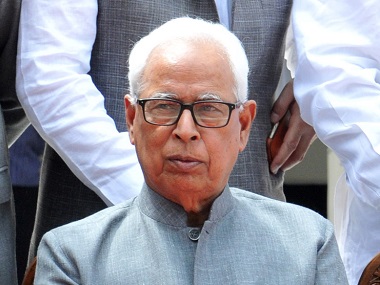 Jammu and Kashmir governor NN Vohra is likely to be replaced after 15 August due to differences with the Centre over the revocation of Article 35A of the Indian Constitution, which bars outsiders from owning property or getting jobs.
Jammu and Kashmir governor NN Vohra is likely to be replaced after 15 August due to differences with the Centre over the revocation of Article 35A of the Indian Constitution, which bars outsiders from owning property or getting jobs.
Vohra has put the BJP at the Centre in tight spot after the state government — which has been under Governor’s Rule since 20 June — decided to file a memorandum in the Supreme Court to seek the deferment of the case. The BJP has been looking to do away with the special status and is in favour of settling outsiders in Jammu and Kashmir.
Vohra met state Advocate General DC Raina and discussed several matters pending in different courts as well as the legal defence that could be mounted by the state to defend Article 35A. Raina said Vohra was of the view that the case should be deferred and a memo will be filed before the apex court in this regard. “A memo will be moved before the court before the case is heard,” Raina said. “State government has continued with the previous team of lawyers to defend the case. Fali S Nariman, the country’s top lawyer, will argue the case.” It is also learnt that Vohra has also conveyed his disagreement over the issue to Home Minister Rajnath Singh.
However, Deputy Secretary Hitesh Gupta said that he was not aware whether Vohra has taken up the matter with the Centre. An official said New Delhi has not extended Vohra’s tenure and that he could be replaced after 15 August. The state government and the security establishment are on the edge as separatists have given a shutdown call over the Article 35A and threatened mass agitation.
Separatists have also received support from mainstream political parties, who believe that Article 35-A is an established law which was made part of the Indian Constitution through an order issued by the president in 1954, in an affirmation that the state will be empowered to frame state subject laws. The revocation could ensure that people from other states are settled in Jammu and Kashmir and that the state’s constitution and the identity — by way of a separate flag — is removed.
As per the Jammu and Kashmir Constitution, those who had been living in the state before 14 May, 1954, and their descendants are subjects of the state. The law also treats those who are living in the part of Kashmir which is administered by Pakistan as state subjects. Any amendment in the permanent resident law will have to done by a two-third majority of state Assembly.
Article 35A was further seen as a commitment by New Delhi that it will not make laws other than in the matters of defence, communication and external affairs for the state. Jammu and Kashmir acceded to the Indian Union on the basis of that commitment. That promise was recognised through Article 370, which also laid down the procedure that could be adopted to extend central laws to the state.
Even separatists are defending Article 35A as they see its possible removal as an attempt to change the demography of the state by allowing Hindus from outside to settle here and tilt the vote in favour India in the event of any referendum. Mainstream parties defend Article 35A to secure the rights of people in government jobs and scholarships.
After the BJP earlier pulled support from Peoples Democratic Party chief Mehbooba Mufti and toppled her government, it is now locked in a confrontation with Vohra. Former deputy chief minister and senior BJP leader Kavinder Gupta said the BJP would wait for the verdict of Supreme Court.
However, he added, “The BJP was for complete integration of the state with Indian Union. The sovereignty and integrity of the nation is paramount to us.”
Although the BJP earlier, in the agenda of alliance with the PDP, promised that the constitutional position of the state with respect to Indian Union would remain intact, it said the party didn’t give up its stance on the revocation of Article 370 or 35-A.



